|
European Classical Mahjong Rules
|
Drawing tiles
|
The game is now ready and new tiles will be taken from the “Wall” where the drawing of the initial hand ended. The dealer (or East) starts the game by discarding a tile face up in the center of the table. South then draws and discards a tile, followed by West and North. Thus, the draw goes counter-clockwise around the table, unless a tile is thrown which a player can claim. In that case, the turn jumps to the respective player’s position. We’ll go into more details in the Game Play section.
|
Game Play
|
When a player discards a tile, any of the other players may pick up the discarded tile if he has a set, which may be completed by the discarded tile. However, a drawback of this action is that the player must now expose the completed set to the others, thus providing them a glimpse of what kind of hands he is creating. A player can pick up a discarded tile to complete one of the following sets:
|
| 1. |
Chow - a set of 3 tiles of the same suit in sequence. A player must say “Chow” when he gets another player’s discarded tile to form the combination. A chow can only be performed if the tile was discarded by the player from the claimer’s left. Here is an example of a Chow:
|

|
| 2. |
Pung - a set of 3 identical tiles. A player must say “Pung” when he gets another player’s discarded tile to form the combination. The player then must show the created set and then discard a tile. The next player (counterclockwise) will then have the next turn. Here is an example of a Pung:
|

|
| 3. |
Kong -a set of 4 identical tiles. When a Kong is formed with a discarded tile, the player must then expose the set. In addition, the Kong cannot be split once exposed. However, if a Kong is made from the existing hand, the player can conceal it from the others. The advantage of concealing a Kong is that the player can split the 4 tiles and use one tile to form a Chow if necessary. Here is an example of a Kong:
|

|
|
Whichever the case, the player then draws from the Dead Wall for a tile and discardw as usual.
Note: a player cannot Kong a discarded tile to convert an exposed Pung to a Kong.
More details about Kong:
If a player draw from the wall to make a Kong in his hand, the player should expose the Kong on the table and draw a tile from the Dead Wall to make a correct number of hand, and then discard one piece. If this is the case, two of the Kong pieces are placed on the table face up and the two end pieces face down to show that the Kong still counts as if still held in the hand.
If a player has a pung on the table and draws the 4th from the wall, the player can place the 4th tile with the pung to make a Kong.
|
| 4. |
Pair -An Eye, or a Pair, are two identical tiles. It cannot be created with discarded tiles unless to declare a win / mahjong, and only one set is allowed in a hand. Here is an example of a Pair:
|

|
|
How about if two players are claiming a discarded tile at the same time? Then the Claim Priority is in effect.
- Win has priority over Pong, Kong, and Chow.
- Pong & Kong has priority over Chow.
- If Two Players want to claim the same tile to win, 1st player to claim the tile who sits to the right of the thrower wins.
|
Waiting to Win
|
A player with one tile short of winning the game is considered to have a “ready hand”. This is called “waiting” because that player is basically waiting for certain tiles to complete his hand.
|
Winning
|
When a player creates a set of hand or “mahjong”, he wins the game. A winning hand consists of four sets of chow, pung, or kong, and a pair.
After each hand, the wind/seating position will rotate counterclockwise. The wind / seating position will also rotate in event of a Dead Hand.
|
Round
|
In mahjong, there are 4 rounds: East, South, West and North Round.
Within each round, the winds / seating position will rotate as follows: East, South, West, North (counterclockwise). This also happens in the event of a dead hand (where nobody wins).
|
Round
|
Position
|
|
East
|
South
|
West
|
North
|
| 1 (East Wind Round) |
East(A) |
South(B) |
West(C) |
North(D) |
| 2 (South Wind Round)
|
South(B) |
East(A)
|
North(D)
|
West(C) |
| 3 (West Wind Round) |
West(C) |
North(D) |
South(B) |
East(A) |
| 4 (North Wind Round) |
North(D) |
West(C) |
East(A) |
South(B) |
|
|
1st Round
|
2nd Round
|
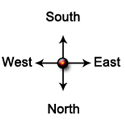 |
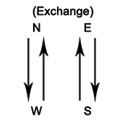 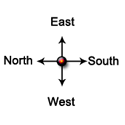 |
|
3rd Round
|
4th Round
|
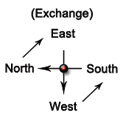 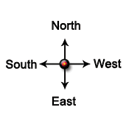 |
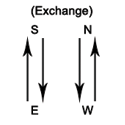 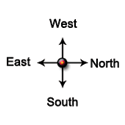 |
|
Thus, there are total of 16 hands in one complete game of mahjong |
| |
Scoring
|
Please go to "European Classical Mahjong Scoring" section.
|
| Previous 1 2 3 4
|
|